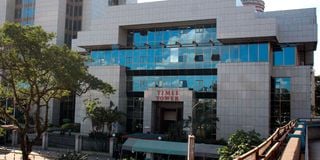Tax compliance still a challenge in Kenya

Times Tower in Nairobi, the headquarters of Kenya Revenue Authority. The taxman should be more innovative to ensure that there is more government revenue.
What you need to know:
- The taxman should be more innovative to ensure that there is more government revenue.
- KRA’s digital mobilisation model may be commendable but its initiatives on data collection are modest. The agency’s technology, in its entirety, may not fix the problem.
- There is a need for culture change at KRA. For instance, it is unfair for faithful taxpayers to be lumped together with tax evaders and, thus, treated so.
President William Ruto’s decision to tax every Kenyan from when they turn 18 may not be a feasible solution to the country’s reliance on multilateral debt.
The taxman should be more innovative to ensure that there is more government revenue.
The annual revenue collected by Kenya Revenue Authority (KRA) is mainly used to pay external debt, which has made it difficult to finance development projects to their completion and satisfactorily deliver services.
KRA’s digital mobilisation model may be commendable but its initiatives on data collection are modest. The agency’s technology, in its entirety, may not fix the problem.
There is a need for culture change at KRA. For instance, it is unfair for faithful taxpayers to be lumped together with tax evaders and, thus, treated so.
The introduction of online payments and services as a result of advanced technology has also proved to be one of the numerous obstacles to tax compliance.
Telcos such as Safaricom pay huge amounts of taxes and duties to the government, thanks to their customer-friendly services. The government should adopt a people-centred tax system that will not hurt the businesses of common wananchi.
Inequalities
Developing countries such as Kenya have challenges in tax compliance due to the inequalities borne by the taxation system.
A World Bank report shows that the wealthiest people in the country pay 80 per cent of the tax due while the larger proportion of the population is not in the formal sector.
Over-reliance on taxing only the individuals who are on the payroll for their being easy prey is a big obstacle to revenue collection even after several tax reforms over the years.
Our complex tax policies give leeway to tax evasion, which explains the dip in revenue collection over the past decade. This, coupled with the corruption menace, becomes a set-back to increased amount the Exchequer collects.
There is a need for regulations to bring clarity to ambiguous tax provisions. That should be followed by government engagement with the taxpayer to ensure dialogue, which will facilitate synergy between the two in order to streamline the administration and collection of taxes.
There should be more involvement of taxpayers in the creation of policies, which will ensure that citizens do not view paying taxes as a burden but civic duty.
The high corporate tax also contributes to the low tax compliance, considering that there are engines of growth and create employment. Lowering tax rates for companies will attract investors and also bolster the economy.
The computerisation of KRA systems will help in designing a taxation system that can seal the loopholes that aid tax avoidance.





